Legislative and Treaty Impact on Nippon's Australian Telecom Business
VerifiedAdded on 2023/06/07
|12
|2708
|170
Report
AI Summary
This report analyzes the Nippon Company's operations within the highly competitive Australian telecom market. It explores the significant impact of domestic legislation and government agreements on the company's business activities. The report examines the existing legislative and regulatory frameworks, including the ownership separation policy and restrictions on broadband systems, which pose challenges to Nippon's market expansion. Furthermore, it assesses the influence of treaties and conventions, particularly the Japan-Australia Economic Partnership Agreement (JAEPA), which aims to establish a better telecom industry framework. The report concludes that while domestic legislation hampers Nippon's business, the JAEPA offers a more favorable environment for the company. The analysis covers the competitive landscape, government policies, and strategic implications for Nippon's market presence in Australia.
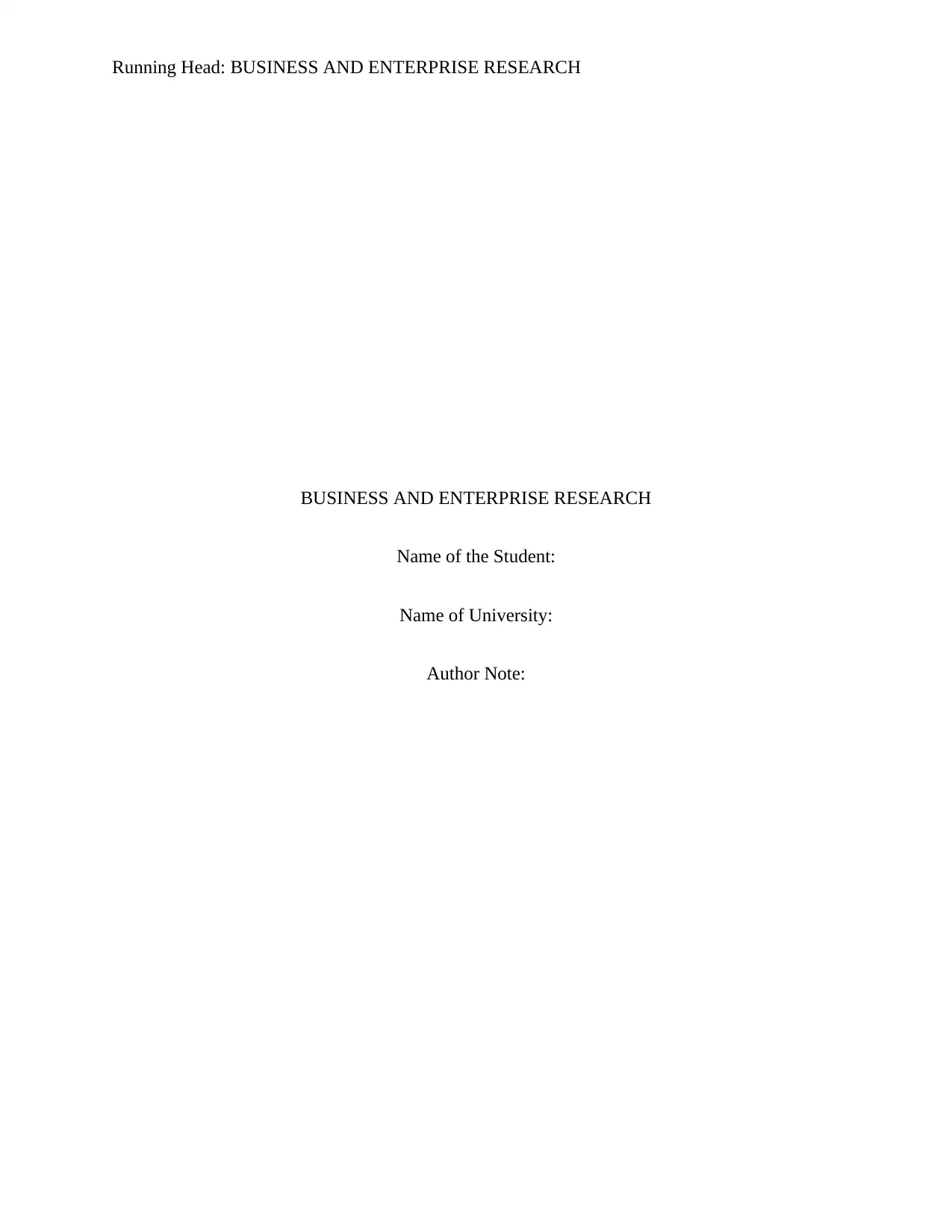
Running Head: BUSINESS AND ENTERPRISE RESEARCH
BUSINESS AND ENTERPRISE RESEARCH
Name of the Student:
Name of University:
Author Note:
BUSINESS AND ENTERPRISE RESEARCH
Name of the Student:
Name of University:
Author Note:
Paraphrase This Document
Need a fresh take? Get an instant paraphrase of this document with our AI Paraphraser
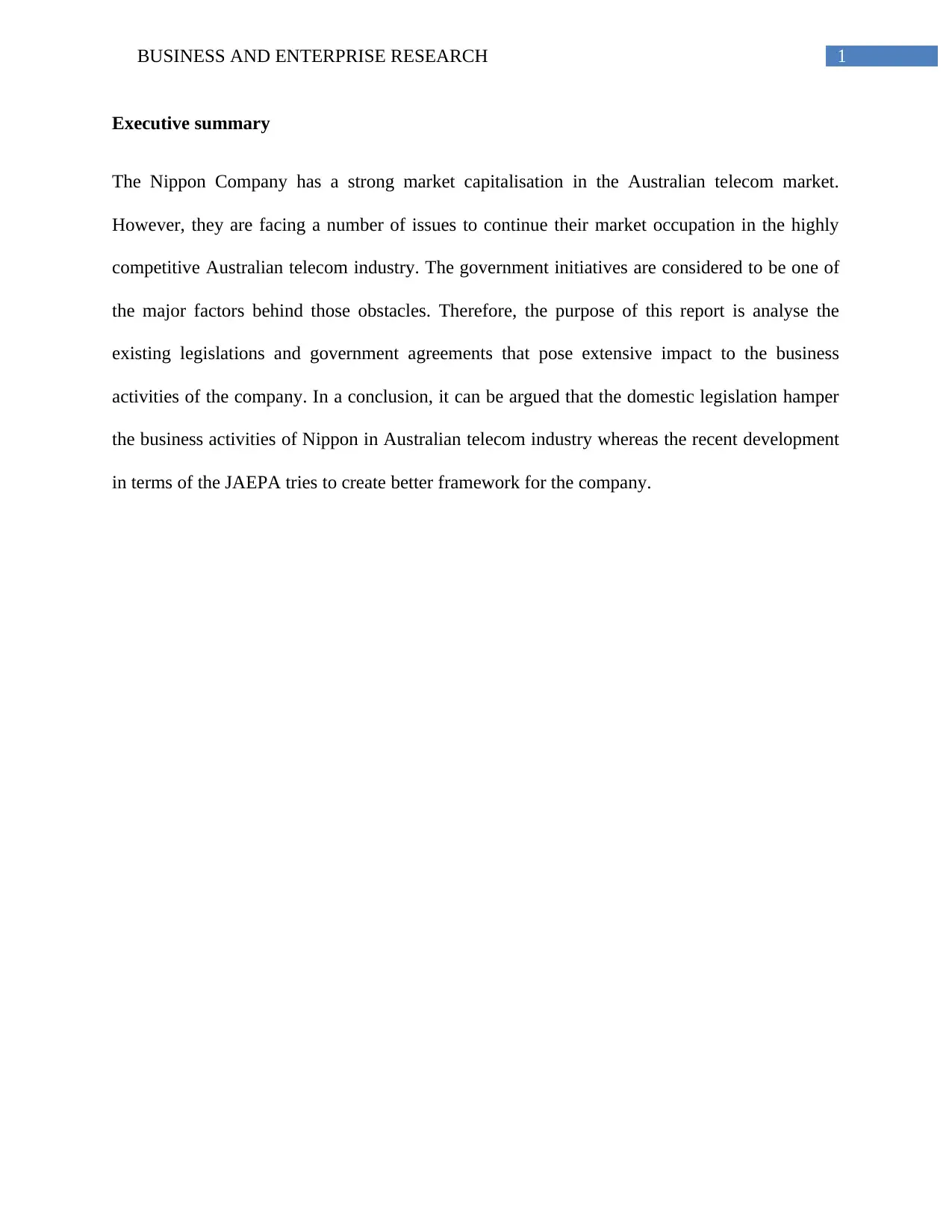
1BUSINESS AND ENTERPRISE RESEARCH
Executive summary
The Nippon Company has a strong market capitalisation in the Australian telecom market.
However, they are facing a number of issues to continue their market occupation in the highly
competitive Australian telecom industry. The government initiatives are considered to be one of
the major factors behind those obstacles. Therefore, the purpose of this report is analyse the
existing legislations and government agreements that pose extensive impact to the business
activities of the company. In a conclusion, it can be argued that the domestic legislation hamper
the business activities of Nippon in Australian telecom industry whereas the recent development
in terms of the JAEPA tries to create better framework for the company.
Executive summary
The Nippon Company has a strong market capitalisation in the Australian telecom market.
However, they are facing a number of issues to continue their market occupation in the highly
competitive Australian telecom industry. The government initiatives are considered to be one of
the major factors behind those obstacles. Therefore, the purpose of this report is analyse the
existing legislations and government agreements that pose extensive impact to the business
activities of the company. In a conclusion, it can be argued that the domestic legislation hamper
the business activities of Nippon in Australian telecom industry whereas the recent development
in terms of the JAEPA tries to create better framework for the company.
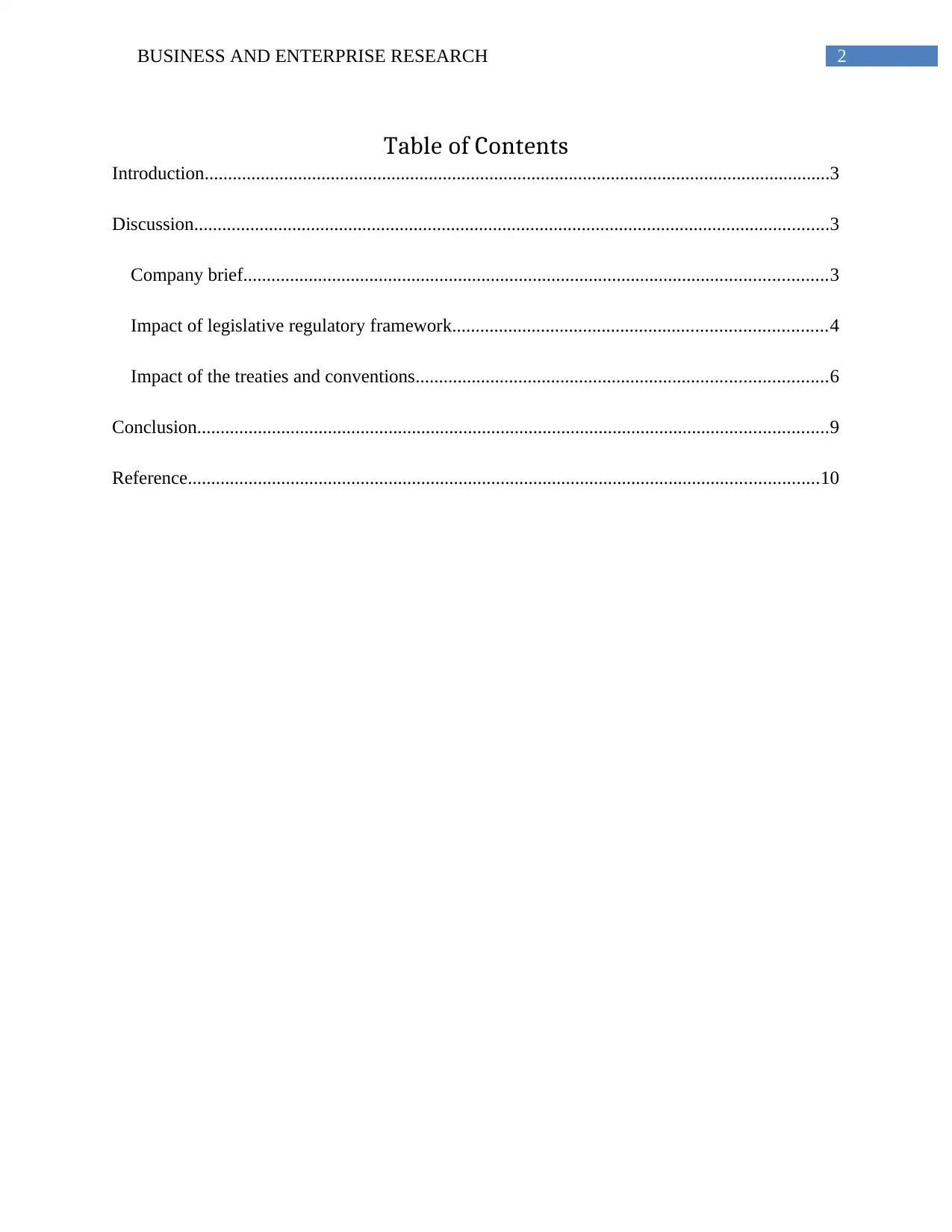
2BUSINESS AND ENTERPRISE RESEARCH
Table of Contents
Introduction......................................................................................................................................3
Discussion........................................................................................................................................3
Company brief.............................................................................................................................3
Impact of legislative regulatory framework................................................................................4
Impact of the treaties and conventions........................................................................................6
Conclusion.......................................................................................................................................9
Reference.......................................................................................................................................10
Table of Contents
Introduction......................................................................................................................................3
Discussion........................................................................................................................................3
Company brief.............................................................................................................................3
Impact of legislative regulatory framework................................................................................4
Impact of the treaties and conventions........................................................................................6
Conclusion.......................................................................................................................................9
Reference.......................................................................................................................................10
⊘ This is a preview!⊘
Do you want full access?
Subscribe today to unlock all pages.

Trusted by 1+ million students worldwide
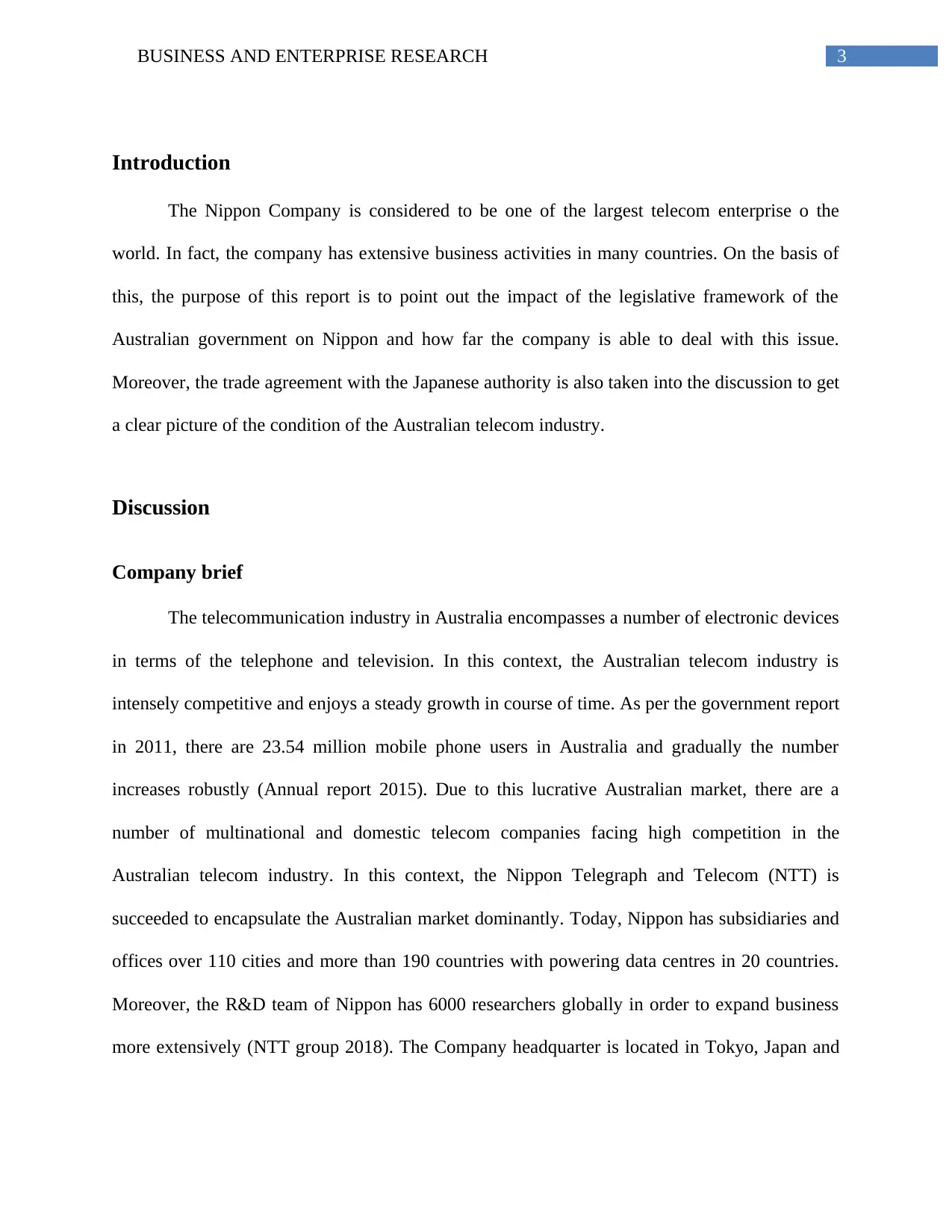
3BUSINESS AND ENTERPRISE RESEARCH
Introduction
The Nippon Company is considered to be one of the largest telecom enterprise o the
world. In fact, the company has extensive business activities in many countries. On the basis of
this, the purpose of this report is to point out the impact of the legislative framework of the
Australian government on Nippon and how far the company is able to deal with this issue.
Moreover, the trade agreement with the Japanese authority is also taken into the discussion to get
a clear picture of the condition of the Australian telecom industry.
Discussion
Company brief
The telecommunication industry in Australia encompasses a number of electronic devices
in terms of the telephone and television. In this context, the Australian telecom industry is
intensely competitive and enjoys a steady growth in course of time. As per the government report
in 2011, there are 23.54 million mobile phone users in Australia and gradually the number
increases robustly (Annual report 2015). Due to this lucrative Australian market, there are a
number of multinational and domestic telecom companies facing high competition in the
Australian telecom industry. In this context, the Nippon Telegraph and Telecom (NTT) is
succeeded to encapsulate the Australian market dominantly. Today, Nippon has subsidiaries and
offices over 110 cities and more than 190 countries with powering data centres in 20 countries.
Moreover, the R&D team of Nippon has 6000 researchers globally in order to expand business
more extensively (NTT group 2018). The Company headquarter is located in Tokyo, Japan and
Introduction
The Nippon Company is considered to be one of the largest telecom enterprise o the
world. In fact, the company has extensive business activities in many countries. On the basis of
this, the purpose of this report is to point out the impact of the legislative framework of the
Australian government on Nippon and how far the company is able to deal with this issue.
Moreover, the trade agreement with the Japanese authority is also taken into the discussion to get
a clear picture of the condition of the Australian telecom industry.
Discussion
Company brief
The telecommunication industry in Australia encompasses a number of electronic devices
in terms of the telephone and television. In this context, the Australian telecom industry is
intensely competitive and enjoys a steady growth in course of time. As per the government report
in 2011, there are 23.54 million mobile phone users in Australia and gradually the number
increases robustly (Annual report 2015). Due to this lucrative Australian market, there are a
number of multinational and domestic telecom companies facing high competition in the
Australian telecom industry. In this context, the Nippon Telegraph and Telecom (NTT) is
succeeded to encapsulate the Australian market dominantly. Today, Nippon has subsidiaries and
offices over 110 cities and more than 190 countries with powering data centres in 20 countries.
Moreover, the R&D team of Nippon has 6000 researchers globally in order to expand business
more extensively (NTT group 2018). The Company headquarter is located in Tokyo, Japan and
Paraphrase This Document
Need a fresh take? Get an instant paraphrase of this document with our AI Paraphraser
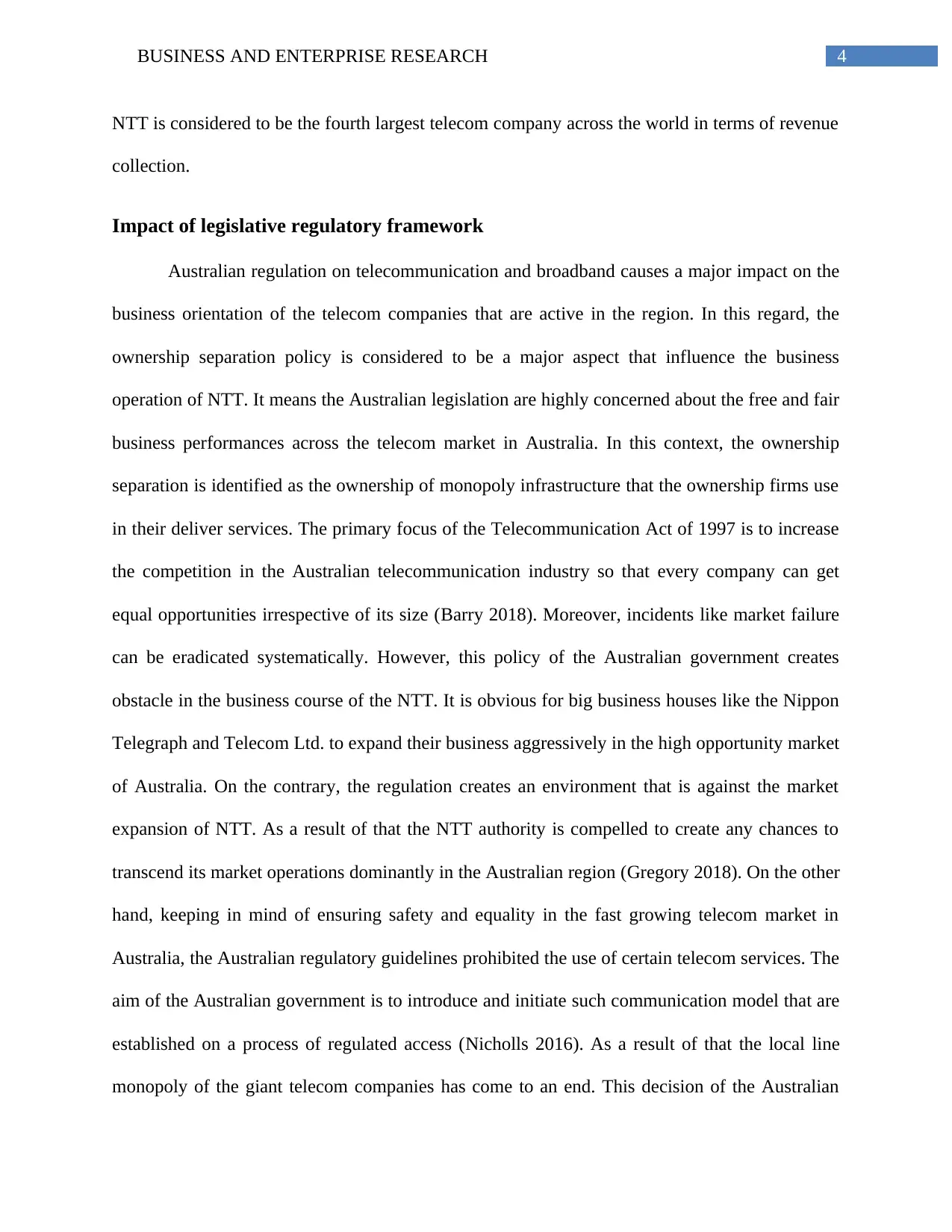
4BUSINESS AND ENTERPRISE RESEARCH
NTT is considered to be the fourth largest telecom company across the world in terms of revenue
collection.
Impact of legislative regulatory framework
Australian regulation on telecommunication and broadband causes a major impact on the
business orientation of the telecom companies that are active in the region. In this regard, the
ownership separation policy is considered to be a major aspect that influence the business
operation of NTT. It means the Australian legislation are highly concerned about the free and fair
business performances across the telecom market in Australia. In this context, the ownership
separation is identified as the ownership of monopoly infrastructure that the ownership firms use
in their deliver services. The primary focus of the Telecommunication Act of 1997 is to increase
the competition in the Australian telecommunication industry so that every company can get
equal opportunities irrespective of its size (Barry 2018). Moreover, incidents like market failure
can be eradicated systematically. However, this policy of the Australian government creates
obstacle in the business course of the NTT. It is obvious for big business houses like the Nippon
Telegraph and Telecom Ltd. to expand their business aggressively in the high opportunity market
of Australia. On the contrary, the regulation creates an environment that is against the market
expansion of NTT. As a result of that the NTT authority is compelled to create any chances to
transcend its market operations dominantly in the Australian region (Gregory 2018). On the other
hand, keeping in mind of ensuring safety and equality in the fast growing telecom market in
Australia, the Australian regulatory guidelines prohibited the use of certain telecom services. The
aim of the Australian government is to introduce and initiate such communication model that are
established on a process of regulated access (Nicholls 2016). As a result of that the local line
monopoly of the giant telecom companies has come to an end. This decision of the Australian
NTT is considered to be the fourth largest telecom company across the world in terms of revenue
collection.
Impact of legislative regulatory framework
Australian regulation on telecommunication and broadband causes a major impact on the
business orientation of the telecom companies that are active in the region. In this regard, the
ownership separation policy is considered to be a major aspect that influence the business
operation of NTT. It means the Australian legislation are highly concerned about the free and fair
business performances across the telecom market in Australia. In this context, the ownership
separation is identified as the ownership of monopoly infrastructure that the ownership firms use
in their deliver services. The primary focus of the Telecommunication Act of 1997 is to increase
the competition in the Australian telecommunication industry so that every company can get
equal opportunities irrespective of its size (Barry 2018). Moreover, incidents like market failure
can be eradicated systematically. However, this policy of the Australian government creates
obstacle in the business course of the NTT. It is obvious for big business houses like the Nippon
Telegraph and Telecom Ltd. to expand their business aggressively in the high opportunity market
of Australia. On the contrary, the regulation creates an environment that is against the market
expansion of NTT. As a result of that the NTT authority is compelled to create any chances to
transcend its market operations dominantly in the Australian region (Gregory 2018). On the other
hand, keeping in mind of ensuring safety and equality in the fast growing telecom market in
Australia, the Australian regulatory guidelines prohibited the use of certain telecom services. The
aim of the Australian government is to introduce and initiate such communication model that are
established on a process of regulated access (Nicholls 2016). As a result of that the local line
monopoly of the giant telecom companies has come to an end. This decision of the Australian
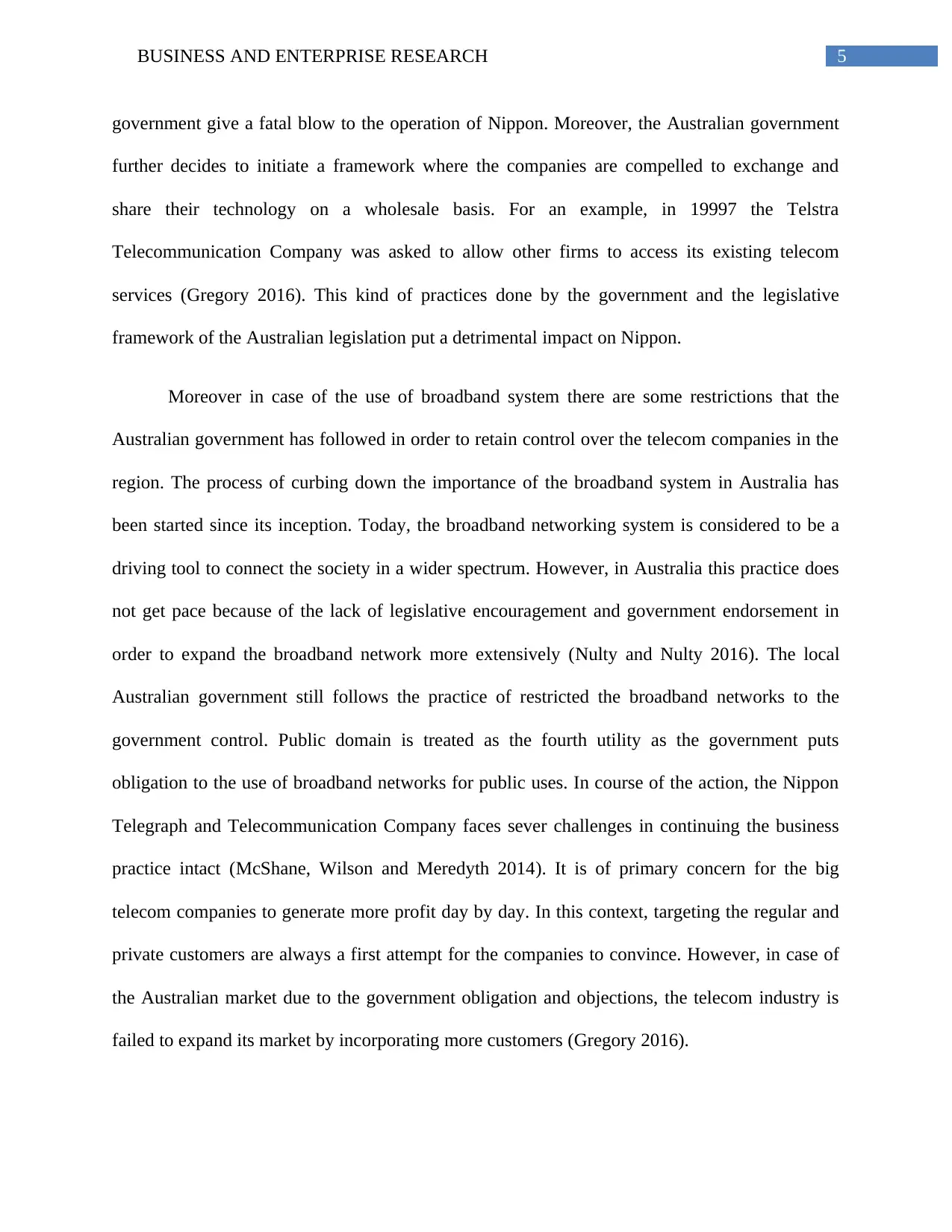
5BUSINESS AND ENTERPRISE RESEARCH
government give a fatal blow to the operation of Nippon. Moreover, the Australian government
further decides to initiate a framework where the companies are compelled to exchange and
share their technology on a wholesale basis. For an example, in 19997 the Telstra
Telecommunication Company was asked to allow other firms to access its existing telecom
services (Gregory 2016). This kind of practices done by the government and the legislative
framework of the Australian legislation put a detrimental impact on Nippon.
Moreover in case of the use of broadband system there are some restrictions that the
Australian government has followed in order to retain control over the telecom companies in the
region. The process of curbing down the importance of the broadband system in Australia has
been started since its inception. Today, the broadband networking system is considered to be a
driving tool to connect the society in a wider spectrum. However, in Australia this practice does
not get pace because of the lack of legislative encouragement and government endorsement in
order to expand the broadband network more extensively (Nulty and Nulty 2016). The local
Australian government still follows the practice of restricted the broadband networks to the
government control. Public domain is treated as the fourth utility as the government puts
obligation to the use of broadband networks for public uses. In course of the action, the Nippon
Telegraph and Telecommunication Company faces sever challenges in continuing the business
practice intact (McShane, Wilson and Meredyth 2014). It is of primary concern for the big
telecom companies to generate more profit day by day. In this context, targeting the regular and
private customers are always a first attempt for the companies to convince. However, in case of
the Australian market due to the government obligation and objections, the telecom industry is
failed to expand its market by incorporating more customers (Gregory 2016).
government give a fatal blow to the operation of Nippon. Moreover, the Australian government
further decides to initiate a framework where the companies are compelled to exchange and
share their technology on a wholesale basis. For an example, in 19997 the Telstra
Telecommunication Company was asked to allow other firms to access its existing telecom
services (Gregory 2016). This kind of practices done by the government and the legislative
framework of the Australian legislation put a detrimental impact on Nippon.
Moreover in case of the use of broadband system there are some restrictions that the
Australian government has followed in order to retain control over the telecom companies in the
region. The process of curbing down the importance of the broadband system in Australia has
been started since its inception. Today, the broadband networking system is considered to be a
driving tool to connect the society in a wider spectrum. However, in Australia this practice does
not get pace because of the lack of legislative encouragement and government endorsement in
order to expand the broadband network more extensively (Nulty and Nulty 2016). The local
Australian government still follows the practice of restricted the broadband networks to the
government control. Public domain is treated as the fourth utility as the government puts
obligation to the use of broadband networks for public uses. In course of the action, the Nippon
Telegraph and Telecommunication Company faces sever challenges in continuing the business
practice intact (McShane, Wilson and Meredyth 2014). It is of primary concern for the big
telecom companies to generate more profit day by day. In this context, targeting the regular and
private customers are always a first attempt for the companies to convince. However, in case of
the Australian market due to the government obligation and objections, the telecom industry is
failed to expand its market by incorporating more customers (Gregory 2016).
⊘ This is a preview!⊘
Do you want full access?
Subscribe today to unlock all pages.

Trusted by 1+ million students worldwide
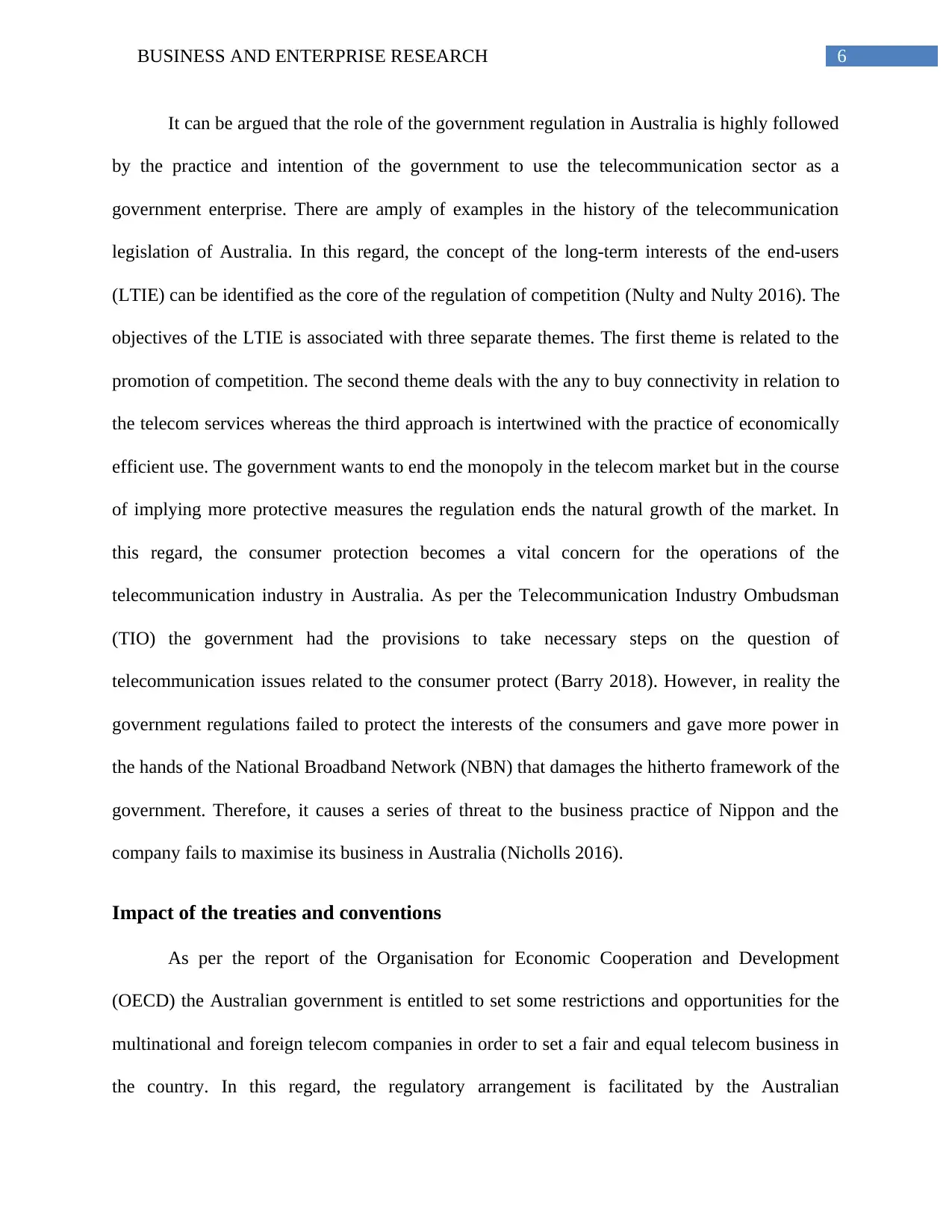
6BUSINESS AND ENTERPRISE RESEARCH
It can be argued that the role of the government regulation in Australia is highly followed
by the practice and intention of the government to use the telecommunication sector as a
government enterprise. There are amply of examples in the history of the telecommunication
legislation of Australia. In this regard, the concept of the long-term interests of the end-users
(LTIE) can be identified as the core of the regulation of competition (Nulty and Nulty 2016). The
objectives of the LTIE is associated with three separate themes. The first theme is related to the
promotion of competition. The second theme deals with the any to buy connectivity in relation to
the telecom services whereas the third approach is intertwined with the practice of economically
efficient use. The government wants to end the monopoly in the telecom market but in the course
of implying more protective measures the regulation ends the natural growth of the market. In
this regard, the consumer protection becomes a vital concern for the operations of the
telecommunication industry in Australia. As per the Telecommunication Industry Ombudsman
(TIO) the government had the provisions to take necessary steps on the question of
telecommunication issues related to the consumer protect (Barry 2018). However, in reality the
government regulations failed to protect the interests of the consumers and gave more power in
the hands of the National Broadband Network (NBN) that damages the hitherto framework of the
government. Therefore, it causes a series of threat to the business practice of Nippon and the
company fails to maximise its business in Australia (Nicholls 2016).
Impact of the treaties and conventions
As per the report of the Organisation for Economic Cooperation and Development
(OECD) the Australian government is entitled to set some restrictions and opportunities for the
multinational and foreign telecom companies in order to set a fair and equal telecom business in
the country. In this regard, the regulatory arrangement is facilitated by the Australian
It can be argued that the role of the government regulation in Australia is highly followed
by the practice and intention of the government to use the telecommunication sector as a
government enterprise. There are amply of examples in the history of the telecommunication
legislation of Australia. In this regard, the concept of the long-term interests of the end-users
(LTIE) can be identified as the core of the regulation of competition (Nulty and Nulty 2016). The
objectives of the LTIE is associated with three separate themes. The first theme is related to the
promotion of competition. The second theme deals with the any to buy connectivity in relation to
the telecom services whereas the third approach is intertwined with the practice of economically
efficient use. The government wants to end the monopoly in the telecom market but in the course
of implying more protective measures the regulation ends the natural growth of the market. In
this regard, the consumer protection becomes a vital concern for the operations of the
telecommunication industry in Australia. As per the Telecommunication Industry Ombudsman
(TIO) the government had the provisions to take necessary steps on the question of
telecommunication issues related to the consumer protect (Barry 2018). However, in reality the
government regulations failed to protect the interests of the consumers and gave more power in
the hands of the National Broadband Network (NBN) that damages the hitherto framework of the
government. Therefore, it causes a series of threat to the business practice of Nippon and the
company fails to maximise its business in Australia (Nicholls 2016).
Impact of the treaties and conventions
As per the report of the Organisation for Economic Cooperation and Development
(OECD) the Australian government is entitled to set some restrictions and opportunities for the
multinational and foreign telecom companies in order to set a fair and equal telecom business in
the country. In this regard, the regulatory arrangement is facilitated by the Australian
Paraphrase This Document
Need a fresh take? Get an instant paraphrase of this document with our AI Paraphraser
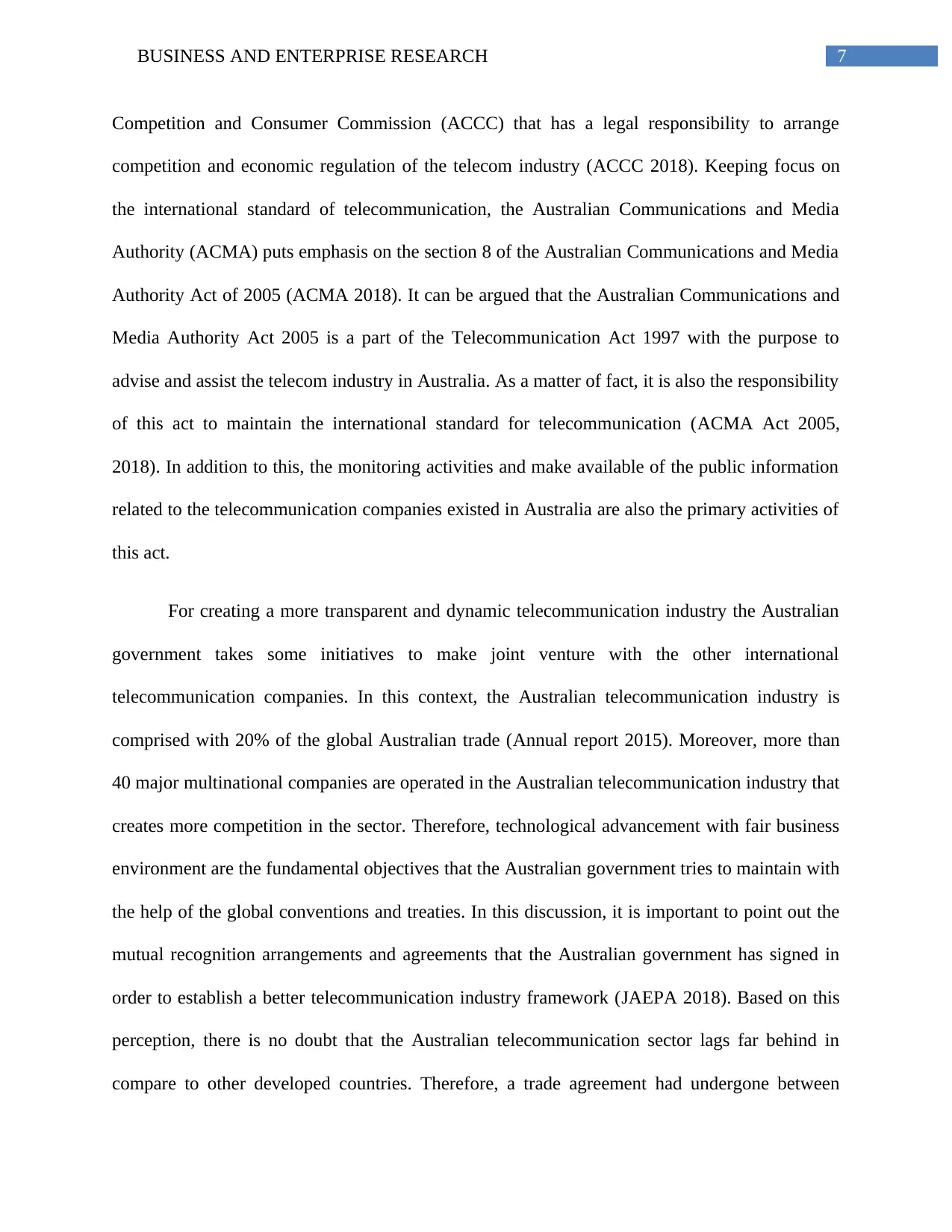
7BUSINESS AND ENTERPRISE RESEARCH
Competition and Consumer Commission (ACCC) that has a legal responsibility to arrange
competition and economic regulation of the telecom industry (ACCC 2018). Keeping focus on
the international standard of telecommunication, the Australian Communications and Media
Authority (ACMA) puts emphasis on the section 8 of the Australian Communications and Media
Authority Act of 2005 (ACMA 2018). It can be argued that the Australian Communications and
Media Authority Act 2005 is a part of the Telecommunication Act 1997 with the purpose to
advise and assist the telecom industry in Australia. As a matter of fact, it is also the responsibility
of this act to maintain the international standard for telecommunication (ACMA Act 2005,
2018). In addition to this, the monitoring activities and make available of the public information
related to the telecommunication companies existed in Australia are also the primary activities of
this act.
For creating a more transparent and dynamic telecommunication industry the Australian
government takes some initiatives to make joint venture with the other international
telecommunication companies. In this context, the Australian telecommunication industry is
comprised with 20% of the global Australian trade (Annual report 2015). Moreover, more than
40 major multinational companies are operated in the Australian telecommunication industry that
creates more competition in the sector. Therefore, technological advancement with fair business
environment are the fundamental objectives that the Australian government tries to maintain with
the help of the global conventions and treaties. In this discussion, it is important to point out the
mutual recognition arrangements and agreements that the Australian government has signed in
order to establish a better telecommunication industry framework (JAEPA 2018). Based on this
perception, there is no doubt that the Australian telecommunication sector lags far behind in
compare to other developed countries. Therefore, a trade agreement had undergone between
Competition and Consumer Commission (ACCC) that has a legal responsibility to arrange
competition and economic regulation of the telecom industry (ACCC 2018). Keeping focus on
the international standard of telecommunication, the Australian Communications and Media
Authority (ACMA) puts emphasis on the section 8 of the Australian Communications and Media
Authority Act of 2005 (ACMA 2018). It can be argued that the Australian Communications and
Media Authority Act 2005 is a part of the Telecommunication Act 1997 with the purpose to
advise and assist the telecom industry in Australia. As a matter of fact, it is also the responsibility
of this act to maintain the international standard for telecommunication (ACMA Act 2005,
2018). In addition to this, the monitoring activities and make available of the public information
related to the telecommunication companies existed in Australia are also the primary activities of
this act.
For creating a more transparent and dynamic telecommunication industry the Australian
government takes some initiatives to make joint venture with the other international
telecommunication companies. In this context, the Australian telecommunication industry is
comprised with 20% of the global Australian trade (Annual report 2015). Moreover, more than
40 major multinational companies are operated in the Australian telecommunication industry that
creates more competition in the sector. Therefore, technological advancement with fair business
environment are the fundamental objectives that the Australian government tries to maintain with
the help of the global conventions and treaties. In this discussion, it is important to point out the
mutual recognition arrangements and agreements that the Australian government has signed in
order to establish a better telecommunication industry framework (JAEPA 2018). Based on this
perception, there is no doubt that the Australian telecommunication sector lags far behind in
compare to other developed countries. Therefore, a trade agreement had undergone between
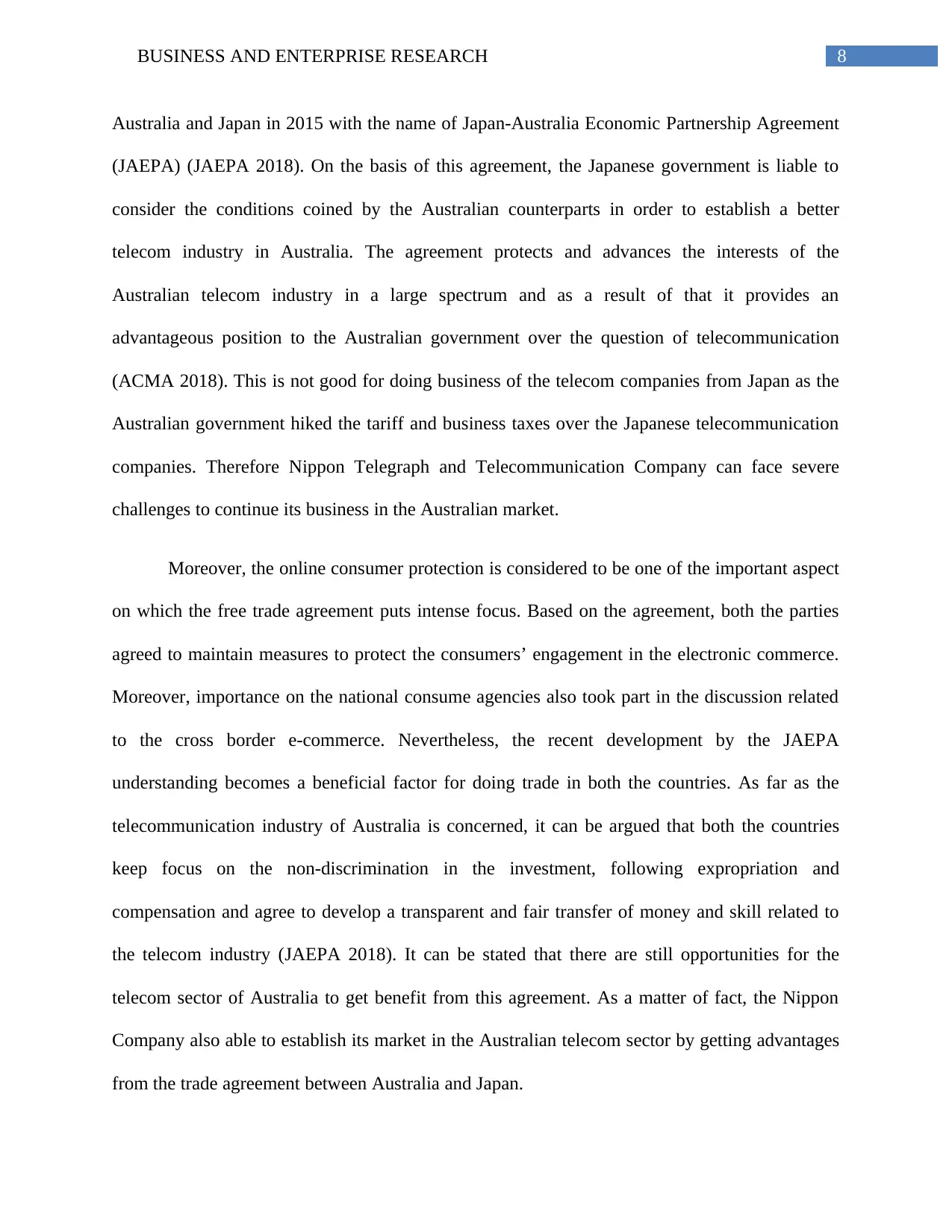
8BUSINESS AND ENTERPRISE RESEARCH
Australia and Japan in 2015 with the name of Japan-Australia Economic Partnership Agreement
(JAEPA) (JAEPA 2018). On the basis of this agreement, the Japanese government is liable to
consider the conditions coined by the Australian counterparts in order to establish a better
telecom industry in Australia. The agreement protects and advances the interests of the
Australian telecom industry in a large spectrum and as a result of that it provides an
advantageous position to the Australian government over the question of telecommunication
(ACMA 2018). This is not good for doing business of the telecom companies from Japan as the
Australian government hiked the tariff and business taxes over the Japanese telecommunication
companies. Therefore Nippon Telegraph and Telecommunication Company can face severe
challenges to continue its business in the Australian market.
Moreover, the online consumer protection is considered to be one of the important aspect
on which the free trade agreement puts intense focus. Based on the agreement, both the parties
agreed to maintain measures to protect the consumers’ engagement in the electronic commerce.
Moreover, importance on the national consume agencies also took part in the discussion related
to the cross border e-commerce. Nevertheless, the recent development by the JAEPA
understanding becomes a beneficial factor for doing trade in both the countries. As far as the
telecommunication industry of Australia is concerned, it can be argued that both the countries
keep focus on the non-discrimination in the investment, following expropriation and
compensation and agree to develop a transparent and fair transfer of money and skill related to
the telecom industry (JAEPA 2018). It can be stated that there are still opportunities for the
telecom sector of Australia to get benefit from this agreement. As a matter of fact, the Nippon
Company also able to establish its market in the Australian telecom sector by getting advantages
from the trade agreement between Australia and Japan.
Australia and Japan in 2015 with the name of Japan-Australia Economic Partnership Agreement
(JAEPA) (JAEPA 2018). On the basis of this agreement, the Japanese government is liable to
consider the conditions coined by the Australian counterparts in order to establish a better
telecom industry in Australia. The agreement protects and advances the interests of the
Australian telecom industry in a large spectrum and as a result of that it provides an
advantageous position to the Australian government over the question of telecommunication
(ACMA 2018). This is not good for doing business of the telecom companies from Japan as the
Australian government hiked the tariff and business taxes over the Japanese telecommunication
companies. Therefore Nippon Telegraph and Telecommunication Company can face severe
challenges to continue its business in the Australian market.
Moreover, the online consumer protection is considered to be one of the important aspect
on which the free trade agreement puts intense focus. Based on the agreement, both the parties
agreed to maintain measures to protect the consumers’ engagement in the electronic commerce.
Moreover, importance on the national consume agencies also took part in the discussion related
to the cross border e-commerce. Nevertheless, the recent development by the JAEPA
understanding becomes a beneficial factor for doing trade in both the countries. As far as the
telecommunication industry of Australia is concerned, it can be argued that both the countries
keep focus on the non-discrimination in the investment, following expropriation and
compensation and agree to develop a transparent and fair transfer of money and skill related to
the telecom industry (JAEPA 2018). It can be stated that there are still opportunities for the
telecom sector of Australia to get benefit from this agreement. As a matter of fact, the Nippon
Company also able to establish its market in the Australian telecom sector by getting advantages
from the trade agreement between Australia and Japan.
⊘ This is a preview!⊘
Do you want full access?
Subscribe today to unlock all pages.

Trusted by 1+ million students worldwide
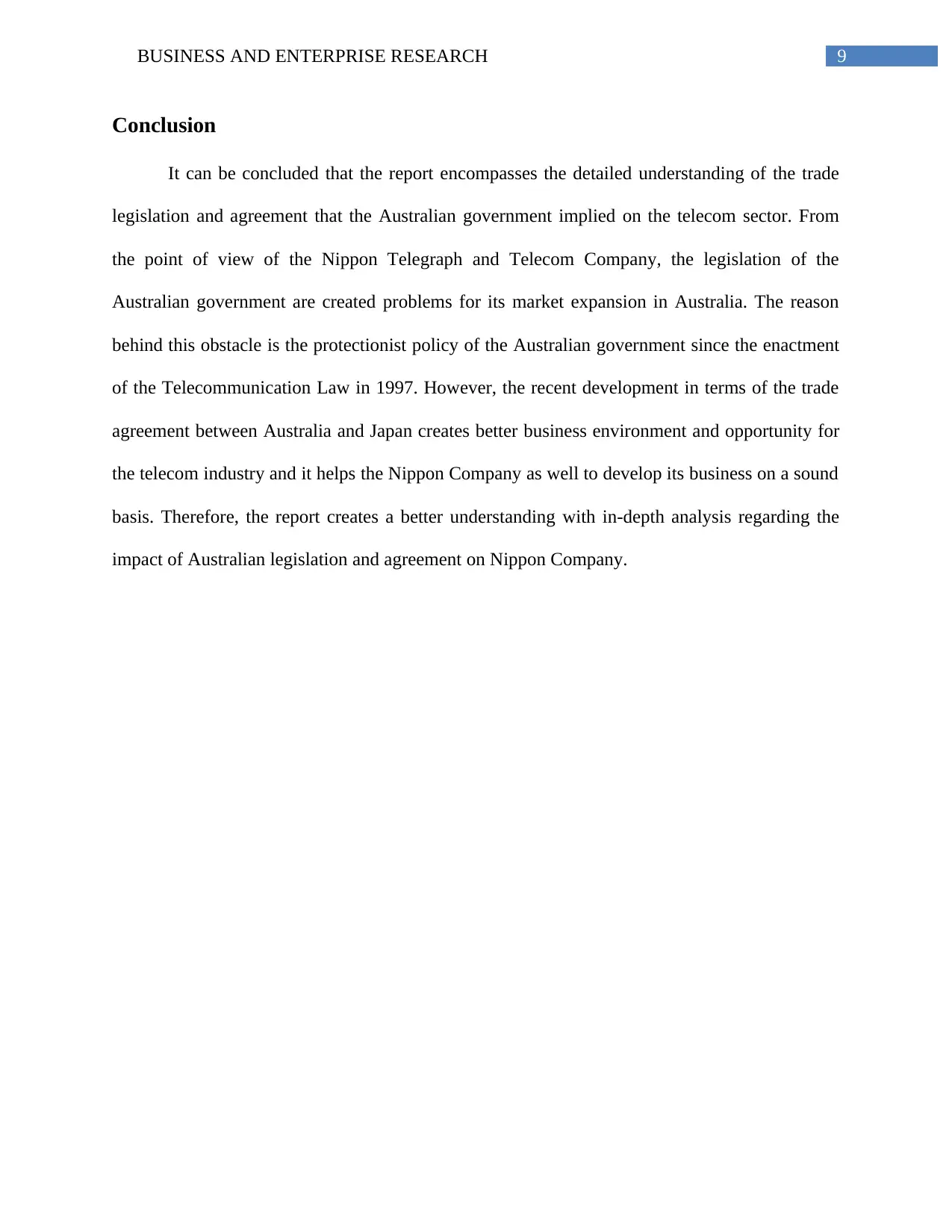
9BUSINESS AND ENTERPRISE RESEARCH
Conclusion
It can be concluded that the report encompasses the detailed understanding of the trade
legislation and agreement that the Australian government implied on the telecom sector. From
the point of view of the Nippon Telegraph and Telecom Company, the legislation of the
Australian government are created problems for its market expansion in Australia. The reason
behind this obstacle is the protectionist policy of the Australian government since the enactment
of the Telecommunication Law in 1997. However, the recent development in terms of the trade
agreement between Australia and Japan creates better business environment and opportunity for
the telecom industry and it helps the Nippon Company as well to develop its business on a sound
basis. Therefore, the report creates a better understanding with in-depth analysis regarding the
impact of Australian legislation and agreement on Nippon Company.
Conclusion
It can be concluded that the report encompasses the detailed understanding of the trade
legislation and agreement that the Australian government implied on the telecom sector. From
the point of view of the Nippon Telegraph and Telecom Company, the legislation of the
Australian government are created problems for its market expansion in Australia. The reason
behind this obstacle is the protectionist policy of the Australian government since the enactment
of the Telecommunication Law in 1997. However, the recent development in terms of the trade
agreement between Australia and Japan creates better business environment and opportunity for
the telecom industry and it helps the Nippon Company as well to develop its business on a sound
basis. Therefore, the report creates a better understanding with in-depth analysis regarding the
impact of Australian legislation and agreement on Nippon Company.
Paraphrase This Document
Need a fresh take? Get an instant paraphrase of this document with our AI Paraphraser
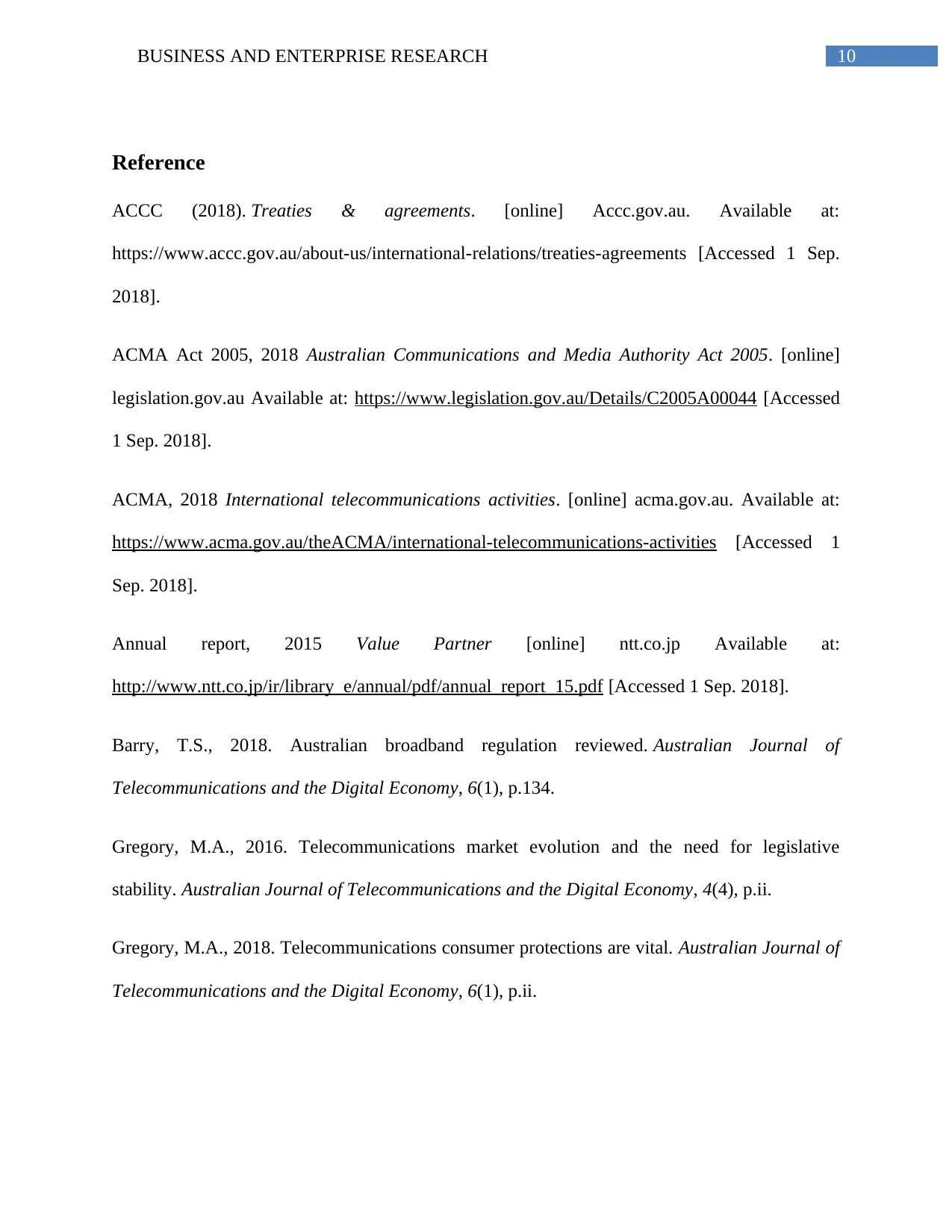
10BUSINESS AND ENTERPRISE RESEARCH
Reference
ACCC (2018). Treaties & agreements. [online] Accc.gov.au. Available at:
https://www.accc.gov.au/about-us/international-relations/treaties-agreements [Accessed 1 Sep.
2018].
ACMA Act 2005, 2018 Australian Communications and Media Authority Act 2005. [online]
legislation.gov.au Available at: https://www.legislation.gov.au/Details/C2005A00044 [Accessed
1 Sep. 2018].
ACMA, 2018 International telecommunications activities. [online] acma.gov.au. Available at:
https://www.acma.gov.au/theACMA/international-telecommunications-activities [Accessed 1
Sep. 2018].
Annual report, 2015 Value Partner [online] ntt.co.jp Available at:
http://www.ntt.co.jp/ir/library_e/annual/pdf/annual_report_15.pdf [Accessed 1 Sep. 2018].
Barry, T.S., 2018. Australian broadband regulation reviewed. Australian Journal of
Telecommunications and the Digital Economy, 6(1), p.134.
Gregory, M.A., 2016. Telecommunications market evolution and the need for legislative
stability. Australian Journal of Telecommunications and the Digital Economy, 4(4), p.ii.
Gregory, M.A., 2018. Telecommunications consumer protections are vital. Australian Journal of
Telecommunications and the Digital Economy, 6(1), p.ii.
Reference
ACCC (2018). Treaties & agreements. [online] Accc.gov.au. Available at:
https://www.accc.gov.au/about-us/international-relations/treaties-agreements [Accessed 1 Sep.
2018].
ACMA Act 2005, 2018 Australian Communications and Media Authority Act 2005. [online]
legislation.gov.au Available at: https://www.legislation.gov.au/Details/C2005A00044 [Accessed
1 Sep. 2018].
ACMA, 2018 International telecommunications activities. [online] acma.gov.au. Available at:
https://www.acma.gov.au/theACMA/international-telecommunications-activities [Accessed 1
Sep. 2018].
Annual report, 2015 Value Partner [online] ntt.co.jp Available at:
http://www.ntt.co.jp/ir/library_e/annual/pdf/annual_report_15.pdf [Accessed 1 Sep. 2018].
Barry, T.S., 2018. Australian broadband regulation reviewed. Australian Journal of
Telecommunications and the Digital Economy, 6(1), p.134.
Gregory, M.A., 2016. Telecommunications market evolution and the need for legislative
stability. Australian Journal of Telecommunications and the Digital Economy, 4(4), p.ii.
Gregory, M.A., 2018. Telecommunications consumer protections are vital. Australian Journal of
Telecommunications and the Digital Economy, 6(1), p.ii.
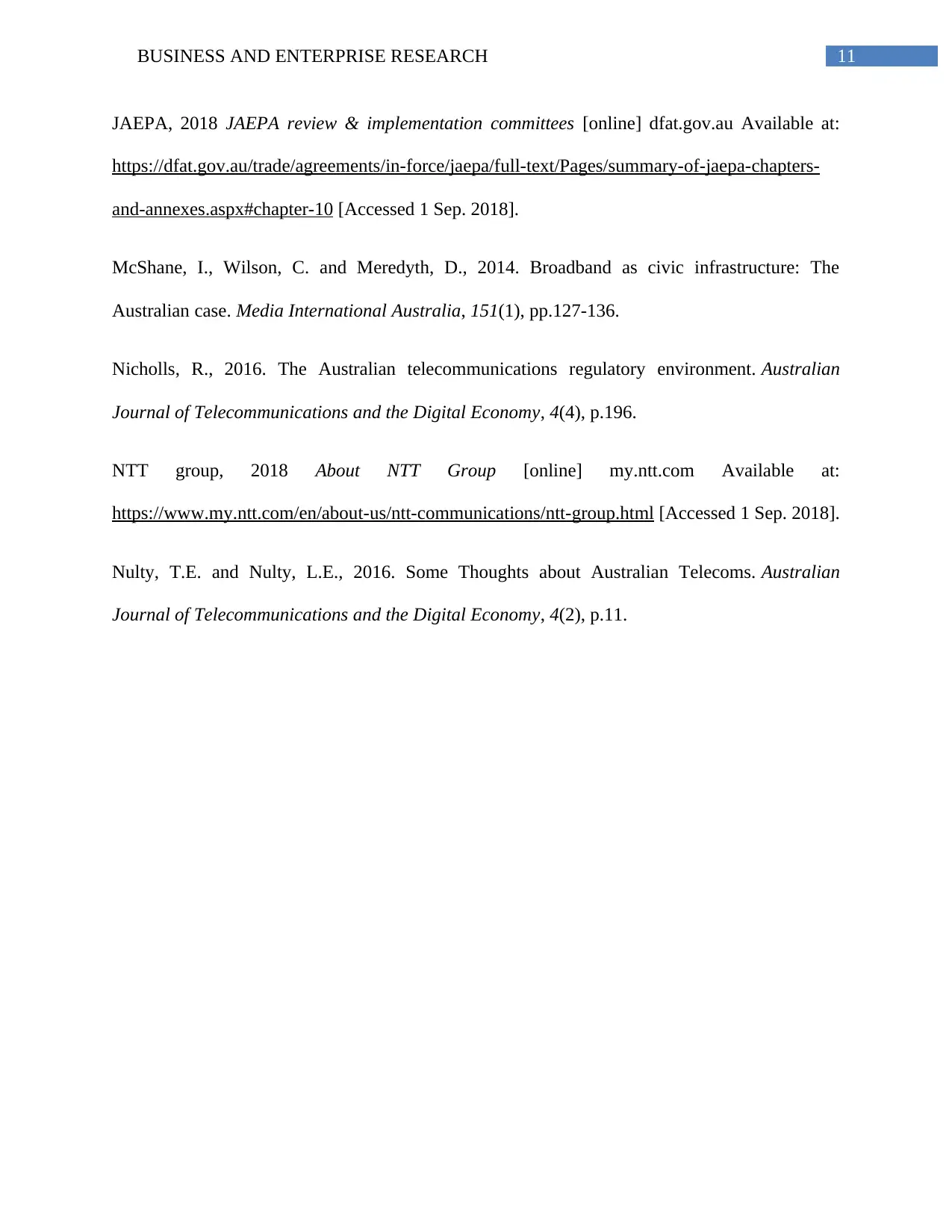
11BUSINESS AND ENTERPRISE RESEARCH
JAEPA, 2018 JAEPA review & implementation committees [online] dfat.gov.au Available at:
https://dfat.gov.au/trade/agreements/in-force/jaepa/full-text/Pages/summary-of-jaepa-chapters-
and-annexes.aspx#chapter-10 [Accessed 1 Sep. 2018].
McShane, I., Wilson, C. and Meredyth, D., 2014. Broadband as civic infrastructure: The
Australian case. Media International Australia, 151(1), pp.127-136.
Nicholls, R., 2016. The Australian telecommunications regulatory environment. Australian
Journal of Telecommunications and the Digital Economy, 4(4), p.196.
NTT group, 2018 About NTT Group [online] my.ntt.com Available at:
https://www.my.ntt.com/en/about-us/ntt-communications/ntt-group.html [Accessed 1 Sep. 2018].
Nulty, T.E. and Nulty, L.E., 2016. Some Thoughts about Australian Telecoms. Australian
Journal of Telecommunications and the Digital Economy, 4(2), p.11.
JAEPA, 2018 JAEPA review & implementation committees [online] dfat.gov.au Available at:
https://dfat.gov.au/trade/agreements/in-force/jaepa/full-text/Pages/summary-of-jaepa-chapters-
and-annexes.aspx#chapter-10 [Accessed 1 Sep. 2018].
McShane, I., Wilson, C. and Meredyth, D., 2014. Broadband as civic infrastructure: The
Australian case. Media International Australia, 151(1), pp.127-136.
Nicholls, R., 2016. The Australian telecommunications regulatory environment. Australian
Journal of Telecommunications and the Digital Economy, 4(4), p.196.
NTT group, 2018 About NTT Group [online] my.ntt.com Available at:
https://www.my.ntt.com/en/about-us/ntt-communications/ntt-group.html [Accessed 1 Sep. 2018].
Nulty, T.E. and Nulty, L.E., 2016. Some Thoughts about Australian Telecoms. Australian
Journal of Telecommunications and the Digital Economy, 4(2), p.11.
⊘ This is a preview!⊘
Do you want full access?
Subscribe today to unlock all pages.

Trusted by 1+ million students worldwide
1 out of 12
Related Documents
Your All-in-One AI-Powered Toolkit for Academic Success.
+13062052269
info@desklib.com
Available 24*7 on WhatsApp / Email
![[object Object]](/_next/static/media/star-bottom.7253800d.svg)
Unlock your academic potential
Copyright © 2020–2026 A2Z Services. All Rights Reserved. Developed and managed by ZUCOL.




